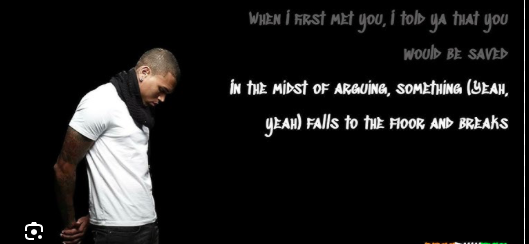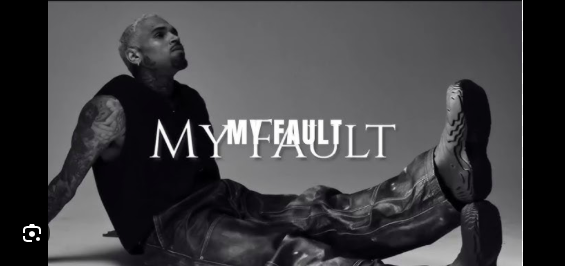“Not My Fault” by Chris Brown, featuring the unmistakable presence of Pharrell Williams, is a sultry, rhythm-soaked track that merges the confessional tone of R&B with the bravado of modern pop-funk. Set against a slick, atmospheric production typical of both artists’ repertoires, the song builds its mood through velvety vocal deliveries, simmering tension, and carefully placed instrumental choices that speak to both the emotional nuance and the sensual undercurrent embedded in the lyrics. It’s a track that dances around responsibility, heartbreak, and intimacy — and in classic Chris Brown fashion, it does so with a seductive confidence that both attracts and deflects blame.
Right from the opening lines in the intro, Chris Brown sets the tone with a playful, self-aware greeting: “Two up, two down” — a nod to his Virginia roots — followed by a series of chuckles and interjections that evoke a sense of familiarity and swagger. This intro serves not only to warm up the listener but to ground the track in personal identity. There’s a coded confidence here — he’s letting you know this is his zone, his emotional territory, and you’re about to be guided through it on his terms.
The first verse picks up the narrative thread in an intriguing way, using the imagery of a newspaper headline to frame the drama: “I picked up the paper and the headline reads / It said, ‘Single broken heart in some satin sheets.’” The juxtaposition of heartbreak and luxury here is classic Brown — emphasizing emotional wreckage but never without the trappings of opulence and sensuality. The “satin sheets” symbolize more than just physical comfort; they represent the intimacy and vulnerability that once existed. The line “And I’m like why? / We had a hell of a time” is at once incredulous and detached, suggesting that the narrator feels removed from the consequences of a relationship gone wrong. It’s almost as if he’s discovering the fallout in the third person, yet clearly still involved.

Then comes the pre-chorus, where Brown’s vocal tone softens and becomes more introspective: “When I first met you, I told ya / That you would be saved.” This moment strikes as particularly revealing — not only does it cast him in a quasi-heroic light, the ‘savior’ in the romantic equation, but it also subtly places responsibility for emotional entanglement on the partner’s expectations. The metaphor of something breaking during an argument, only to realize “it’s your heart,” is poignant, yet delivered with a detached kind of empathy. He doesn’t say our heart or my heart — it’s your heart that’s broken. The blame is displaced, the guilt diffused.
By the time we reach the chorus, Pharrell steps in to inject his distinct ad-libs (“Ho! Ho! Ho! Let’s get it”), which contrast against the emotional weight of the preceding lines. This playful energy disrupts the sadness — and perhaps deliberately so. The chorus, “Shawty is caught up from a long night / She’s ready to fall, but seen it’s alright,” suggests a woman on the edge, both physically exhausted and emotionally vulnerable. Yet Chris Brown quickly interjects with “That’s just something that can happen when you put it down.” Here, the emotional narrative gets flipped — rather than a story of emotional damage, it’s reframed as the inevitable consequence of overwhelming sexual chemistry. The chorus ends with the cold rationalization: “You see, she’s caught up, that’s not my fault, right?” It’s a rhetorical question — but one dripping with dramatic irony. The listener knows, of course, that it probably is his fault.
This is where the brilliance and complexity of “Not My Fault” lie. The song operates in dual registers — on one hand, it’s an R&B slow jam, smooth and intimate, with confessional undertones. On the other, it’s a masterclass in deflection and bravado. Chris Brown, whether intentionally or not, steps into the role of the unreliable narrator. His version of the story — that the woman became too emotionally involved, and it’s just a side effect of his powerful presence — feels self-serving, even manipulative. And yet, the production is so lush, the vocal delivery so convincing, that it’s easy to be seduced by the narrative.
From a musical standpoint, the production is minimal yet lush — rich in reverb, layered harmonies, and sparse but impactful percussion. There’s a sense of space that allows both vocalists to breathe and play with tempo, making each line feel like it’s floating in and out of consciousness. The transitions between Chris Brown’s more melodic singing and Pharrell’s interjections keep the track dynamic and alive. Pharrell doesn’t dominate, but he adds just enough eccentricity to give the song a different flavor. His presence also signals a certain era of R&B/funk revivalism, reminiscent of their past collaborations like “Sweet Life” and “Frontin’.”
Lyrically, the song taps into longstanding themes within Brown’s catalog: women as muses and as emotional casualties, the blurred lines between sex and love, the tension between vulnerability and detachment. Yet what makes this track resonate beyond the surface is its unspoken commentary on emotional responsibility. There’s a knowing wink in the way Chris Brown sings these lines — he knows that saying “not my fault” rarely absolves one of blame. That tension — between denial and acknowledgment, between performance and confession — gives the song depth beyond its melodic sensuality.
Moreover, “Not My Fault” feels like it belongs in a post-Heartbreak on a Full Moon universe — a continuation of Brown’s emotionally chaotic but sonically polished explorations of intimacy, toxicity, and pleasure. The fact that the track’s emotional arc revolves around damage inflicted and then downplayed adds to the narrative tension. Listeners are invited to question the sincerity of the narrator, which is not something often offered by more formulaic love songs. This ambiguity elevates the track.

In terms of broader impact, the song may not be revolutionary in its form or function — it’s not attempting to change the genre or push sonic boundaries — but it does solidify Brown’s ability to consistently deliver emotionally charged, radio-ready R&B with an edge. His vocals remain some of the most agile in the genre, effortlessly gliding between smooth falsettos and conversational baritones. Pharrell, as always, brings an experimental touch — his quirky delivery and rhythm break up the monotony and add texture.
In conclusion, “Not My Fault” is a smooth, layered R&B track that showcases Chris Brown’s strengths — his melodic instincts, his narrative complexity, and his ability to blur the lines between vulnerability and bravado. With Pharrell’s textured input and the subtle but effective production, the song becomes more than just a breakup anthem or a bedroom jam; it becomes a character study of a man both aware and in denial of the emotional consequences he leaves in his wake. Whether or not the listener believes him when he says, “That’s not my fault,” becomes part of the experience — and therein lies the brilliance.
Added by
Lyricssphere
WRITE A COMMENT
WRITE A COMMENT


No comments yet